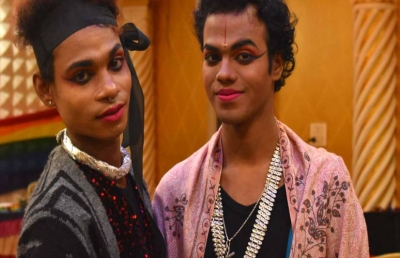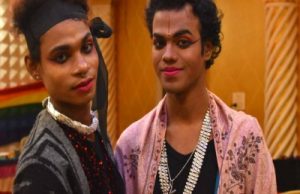
Aptly titled ‘An evening with pride – love is love and we are we: free and equal’, the January 21 event was a first-time experience for most of the nearly 80 participants who came from villages located in Cooch Behar, Siliguri, Jalpaiguri, Alipurduar and Kurseong in the state’s northern region.
“Of course, we have come a long way. Being able to organise this event is in itself proof. A decade ago, terms such as LGBTQIA+ or transgender did not exist in rural areas. Today, we are talking about who is what, and the difference between a hijra and a trans person,” said transgender rights activist Sumi Das (35), also the founder of the NGO Moitrisanjog Society formed in Cooch Behar district in 2019.
“People in society are yet to understand the existence of LGBTQIA+. Most members of our community remain hidden as they do not feel accepted. This is why we only conducted a pride event and not a pride parade,” said Sumi, who worked together with PRISMATIC &+ founder Grace (24) to put the event together.
The confidence to speak out
It was a dream come true for Subha Das (18), who always followed pride parades of metro cities through social media and dreamt of making them one day. “Such events give us the confidence to speak what we feel. After meeting several people during the event, I feel for the first time that I am not alone in this journey anymore. We need to come together as a community, only then can we support each other,” said the transwoman from Ghughumari village.
Subha dropped out of school after Class 10 due to bullying and sexual harassment, and makes leaf plates and dining table cover in a manufacturing unit set up by Moitrisanjog.
“Just because someone is from the community does not mean we need to dress up, dance at weddings, beg on streets or end up in flesh trade. People in rural areas need to come out of this notion and realise that there are respectable ways to earn a livelihood,” voiced Raja Dutta (25), an Odissi dancer from Birpara in Alipurduar.
“Most of us are not aware of our rights. If I am facing violence, I need not sit at home crying and should instead seek help. Through this programme, I shared my own story to tell the community that they should not fear approaching a police station,” said Dutta, who stood up for herself in an abusive relationship, and took legal action against the other person.
The transperson also shared the need for gender-neutral public spaces, citing the case of a friend whose hospital admission following a suicide attempt was delayed because hospital staff could not figure out where to admit the patient.
“Finally, when we intervened and sought admission in the male ward, they took it in writing that they would not be responsible for the patient’s safety. That was appalling,” said Dutta, whose efforts made alma mater Vivekananda College in Alipurduar district set up a gender-neutral toilet last year.
“Milestones like these make us believe that there is a hope for change in society,” said Dutta, who performed Ardhanarishwara Odissi dance at the event.
The right to choose
Educating people in the community about livelihood options and choices was a key part of the event. A discussion was held on conducting sensitisation programmes with police, healthcare workers, media and public, in general, to create awareness and curb crimes against the community. The need for a system to offer immediate help to victims of violence and injustice was highlighted.
“Our aim is to first educate people about our legal rights. Through discussions, we need to gather confidence to be able to express ourselves and come out,” said Sumi. When the event was announced on social media, many messaged the organisers but wanted to keep their identity private in view of safety concerns.
“We have never hosted an event like this before… We all grew up here, but it is rather strange that we have never seen or heard about LGBTQIA+…It does feel good to be a part of social change,” said Prakash Barman, the manager at Hotel Jyotsna.
PRISMATIC &+, a queer and ally-based organisation formed in June 2022, has so far conducted pride parades and events in different parts of Darjeeling, Kurseong, Kalimpong, Sikkim and Gangtok. A practising advocate in the Calcutta High Court, Grace (preferred name and is non-binary) said the NGO was established to provide free-of-cost legal aid to the community. It has so far handled four criminal cases from North Bengal.
“When we conducted events in the hills, we got both bouquets and brickbats. In some places, authorities were not aware of LGBTQIA+ or pride events. We faced many homophobic and transphobic slurs… We need to conduct more such programmes in villages, where many have to hide their identities,” said Grace. In fact, during the event, there were discussions on support-building groups to reach out to the rural populace.
B.Ed student Paulami (22) from Cooch Behar district attended the event with her friend, an ally. “Rural events will pave the way for changes at the grassroots level as that is where the majority of our country’s population lives,” said the lesbian community member.
At home, her mother is the only person who understands and supports her. “Since there is not much awareness about our existence, crime incidents often happen with most of us. If events are regularly organised, especially in schools and colleges, I am hopeful that bullying and harassment will slowly come down and people will become inclusive.”
“I also feel we need to bring every person in the society on board, including the teachers who need to learn to be empathetic,” said Paulami, who has never been to a pride event before.
“It is commendable to see people living in rural areas making an effort to attend. If people from our hometown start recognising our existence, then that itself is a big win for us,” Raja Dutta said.
(Purnima Sah is a West Bengal-based journalist and a member of 101Reporters, a pan-India network of grassroots reporters)
–IANS<br>purnima/dpb
No related posts.










